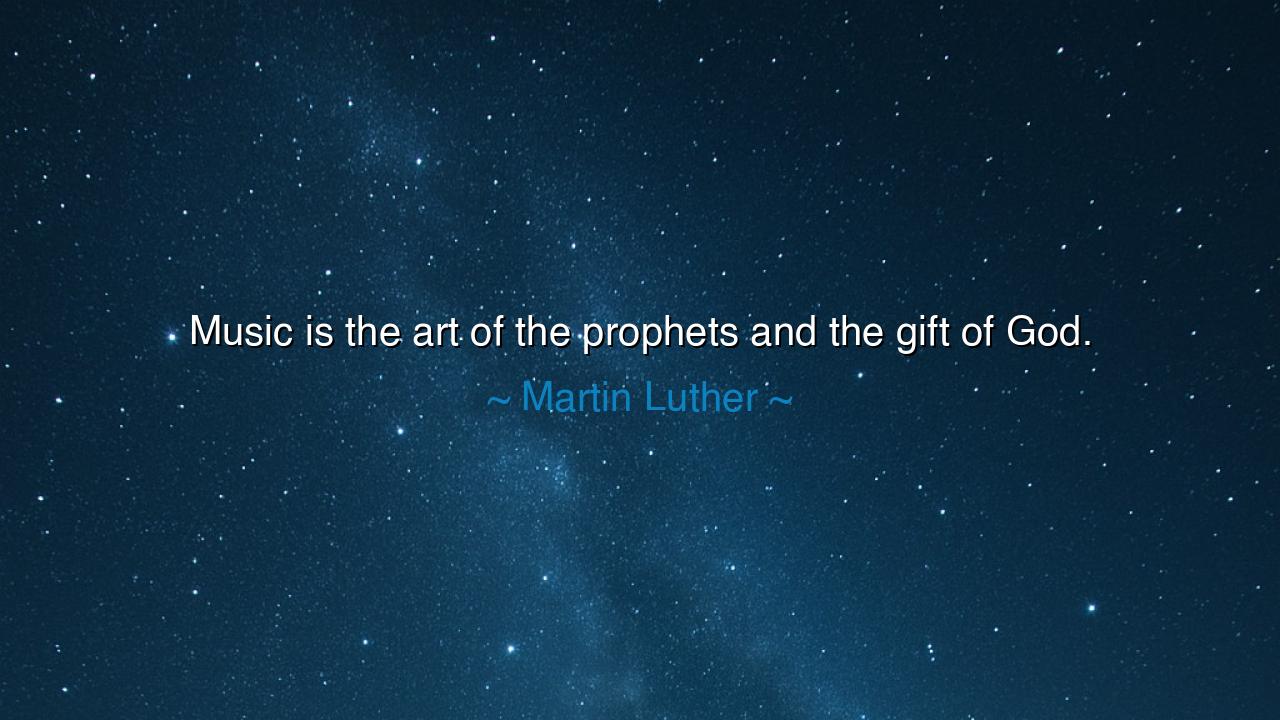
Music is the art of the prophets and the gift of God.






“Music is the art of the prophets and the gift of God.” In these words, Martin Luther speaks with the fire of revelation, for he saw in music not a mere ornament to human life, but a divine current flowing from the Eternal. The prophets, those mighty heralds of truth, spoke with thunderous voices to awaken men’s hearts; yet when words faltered, music itself carried the message further, piercing beyond the walls of reason into the secret chambers of the soul. Music is not bound by tongue nor tribe—it is the universal language, older than kingdoms, mightier than armies, born not from man’s invention alone but from God’s own breath.
The origin of this saying lies in Luther’s recognition of music’s role within faith. In the sixteenth century, when the Reformation stirred Europe with both chaos and hope, Luther raised his voice in hymn and psalm, declaring that songs were sermons in their own right. He believed that when the faithful sang, their voices became like the prophets of old—Isaiah proclaiming salvation, Jeremiah weeping for Jerusalem, David rejoicing with harp and lyre. Thus, music became a holy weapon, a means to teach, to strengthen, and to console the weary, binding the people not only to each other but to their Creator.
Consider the story of Luther himself at Wartburg Castle, hidden away after defying the might of emperor and pope. In exile, beset by danger, he did not drown in silence; he lifted his spirit in song. “A Mighty Fortress Is Our God,” born in such troubled times, was no idle melody—it was a fortress of the soul, echoing the faith of prophets who sang amidst despair. Through this hymn, generations found courage to face tyrants and storms. Music, therefore, proved itself not as idle beauty but as divine strength, carrying the heart upward when the body was bowed low.
Indeed, history itself shows how music has been a prophet’s tongue. In the days of slavery in America, when chains bound hands but not the spirit, the enslaved lifted spirituals to heaven—songs of sorrow and songs of hope. Through them, the voice of prophecy cried out again, declaring freedom when earthly masters denied it. In this, we see the truth of Luther’s words: music is prophecy, whispering of the justice yet unseen, reminding the downtrodden of God’s enduring promise.
The lesson for us, children of a later age, is clear: music is no trivial pastime. It is a vessel of truth, a companion of courage, a gift given not for idle pleasure but for the strengthening of life’s journey. If the prophets clothed truth in words of fire, then music is the flame itself, able to kindle even the coldest hearts. Do not treat it lightly. Do not allow your ears to be filled only with noise that numbs the spirit. Seek instead the harmonies that lift your soul toward what is higher, toward the eternal.
Practically, let each man and woman turn to music not only for diversion but for devotion. Sing when your heart is heavy, for song is a prayer with wings. Teach children to raise their voices not only in laughter but in hymns, in melodies that carry wisdom across generations. Play music in the home not merely to fill the silence, but to create an atmosphere where peace, hope, and joy may dwell. And when despair presses in, remember Luther’s example—sing even then, and discover that song itself is a fortress, a prophet, and a gift divine.
Thus, let this saying be etched upon your heart: “Music is the art of the prophets and the gift of God.” For in music you shall find prophecy’s voice and heaven’s treasure, a sacred inheritance entrusted to humankind. Guard it, honor it, and let it rise from your lips as a living testimony, that generations to come may also taste this gift and know that God has not left the world without His song.






AAdministratorAdministrator
Welcome, honored guests. Please leave a comment, we will respond soon